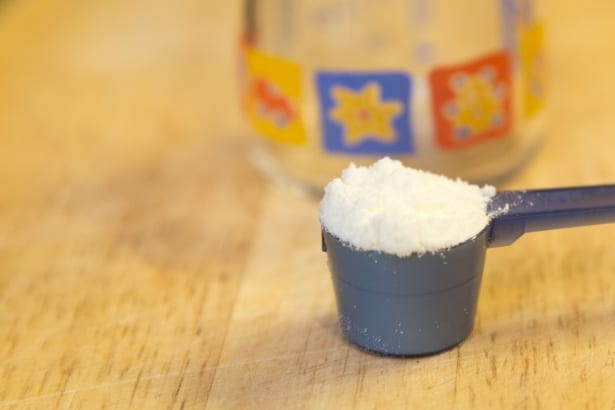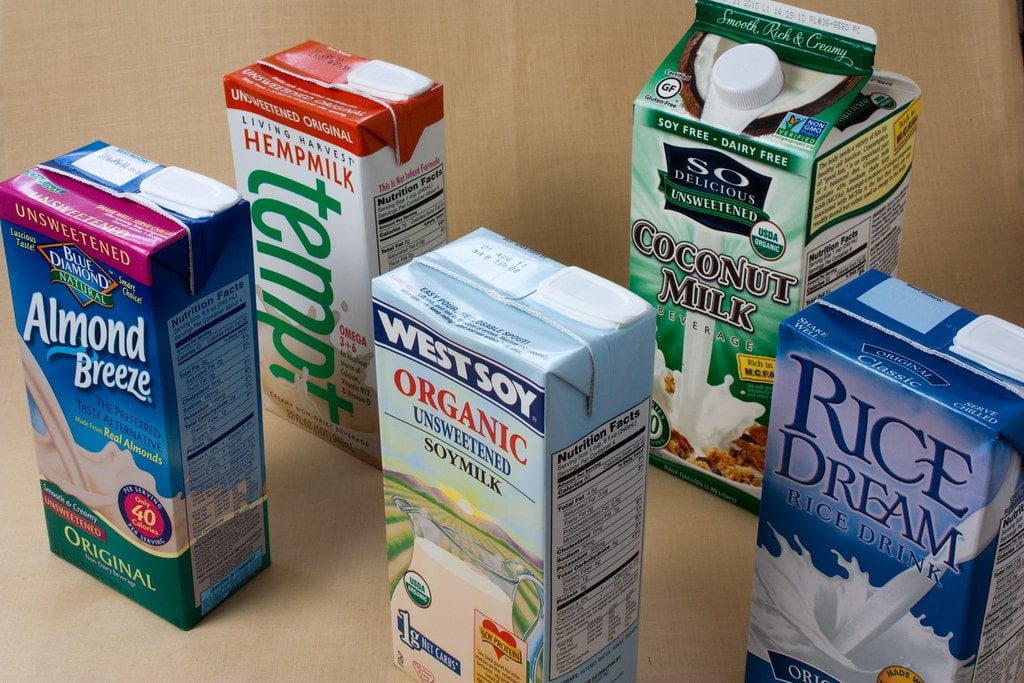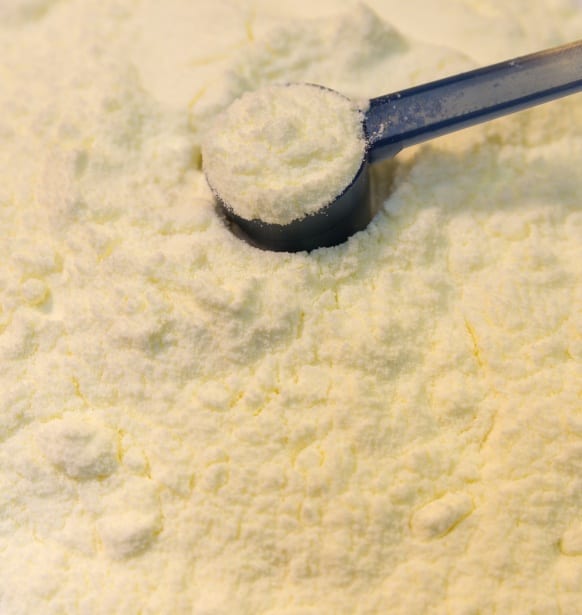Lots of parents look for milk products for their children. But, one of the most popular changes to a kid’s diet is non-dairy baby formula options. While human milk is good, if you’re not nursing your child, you may want to consider infant formulas or powdered formula which are sold in pharmacies. How does feeding baby formula affect a child’s development? Will formula fed babies grow as healthy as breast-fed babies? Are there any plant based milk and are they safer? Does it matter? Well, read on to find out the truth behind it.

Can You Give A Baby Non-dairy Formula From Infancy Forward?
The answer is yes. Usually, there are non-diary infant formulas such as soy, almond, or coconut milk. But, there are now other formulas on the market, and it’s becoming incredibly popular.
The old way of parenting might’ve included baby formula or breast milk until the age of 1, and then after that, whole milk would be introduced, and toddlers would drink it. But, there are actually long-term effects of non-dairy milk, and there are different benefits to each, and here, we’ll talk about how they affect the kid.

Prevents Lactose Intolerance In Babies
Some babies are recommended to drink lactose free baby formulas if they are lactose intolerant, and parents may not even realize that this is happening. To digest lactose, you need to produce something called lactase enzyme. While some adults don’t produce enough of this, in the babies’ period, they don’t produce enough.
All parents want a happy baby. But lactose intolerance can make your baby irritable. It can cause diarrhea, and other damage to the baby’s stomach or digestive enzymes in your intestines, which means they may end up having a gas, bloating, colic, and other issues in the body, both from infancy forward. It is important to know about this so your baby can shift to lactose free baby formula as soon as possible.
Sometimes, this lactose intolerance follows them through the rest of their life, and it may be best not to agitate the child’s intestines with this. Thus it is best to consider lactose free products early on. Non-dairy baby formula or lactose free options may be the best benefit from them since it can prevent this in babies as well.
The Milk Protein Allergy
Did you know that a cow’s milk is one of the top allergens in children? Usually, though, it’s the cow’s milk protein itself, which is a sugar. Milk protein is something that children may have from birth forward, and if you notice that your child has hives, a runny nose, diarrhea, irritability, acid reflux or even vomiting, it may be best to switch the infant formula. Switching formulas to keep a happy baby require that you coordinate with your baby’s doctor so proper diagnosis and recommendation can be given.
Cow’s milk protein allergy is something that don’t show that easily in children, and some children may also have other baby issues mixed with this, too, including colic, gas, and other common concerns.
In really serious cases milk allergies or cow’s milk protein intolerance, it could cause swelling of the tongue, lips, and throat, or even anaphylaxis. In that case, you need to call the emergency services, since that is life-threatening.
A milk allergy or cow’s milk protein intolerance is something that a lot of parents don’t even realize is happening. For those parents who think that goat’s milk is a good alternative to cow milk, that is wrong. Unfortunately, a goat’s milk has the same protein component as the milk from cows. This means that there’s a 90% chance that your baby’s immune system will get confused and will treat both the cow and goat milk as the same, showing goat’s milk intolerance eventually. In short, goat milk cannot be a substitute if your baby is allergic to cow milk.

It May Affect Growth
While your baby will benefit from this if they have allergies, it actually can cause an issue with their height. If you drink cow’s milk or have a dairy infant formula, it actually can lower your height. Most of the time, there is a correlation between lower height and not having a dairy option for milk, but it’s about .5-1.5 cm shorter. It can affect the growth of development, so if you’re concerned about height, a non-dairy formula option may not be suitable for you. But, intolerance to cow’s milk can be assisted if you have non-dairy formula options as well.
It Can Help With Chronic Constipation
If you notice that your child has constipation a lot, you may want to consider a non-dairy infant formula option. In that case, you may need to choose a soy based formula, but even then, it may not be the best option. However, it can be used as a temporary means until you talk to the doctor about the best toddler formulas to buy. Cow’s milk formulas can make constipation worse for those that already have constipation issues, so for infants that may already be suffering. It might be best to get the best milk possible that won’t hurt them.
Can Prevent Issues With Galactosemia
If you know that your child has galactosemia, then you’re going to want to give them a non-dairy formula option. This is rare, but an inherited condition that causes them to have an intolerance to galactose. It’s diagnosed at birth via screening and test or even done prenatally. Many babies with this can’t tolerate breastmilk, and they want to have a lactose free formula option, which means that you want to give them something that doesn’t contain lactose in it. Lactose free formulas are recommended only for babies with lactose intolerance.
Now, this won’t reduce the baby’s fussiness, so if you’re thinking about possibly switching over to that for that very reason, you’re better off not doing so. But, if you know that your child can benefit from this, then you may want to consider this type of powdered formula for them. For many babies, this can be a wonderful addition, and it can be something that they will benefit from immensely. If you know that you’re struggling with constipation and various other issues, then you’re going to definitely benefit from this as well, and make a much better and rewarding result from this. You’ll be able to, with all of this in mind, create a better and more immersive different type of experience for your baby, and you can prevent the lactose intolerances from happening. Hello happy baby!

While it can affect height, it’s less than an inch, so it isn’t anything substantial.
Infant formula can be dairy or dairy-free. It depends on what you need, and for some parents, having this powdered formula is great, since it allows for them to have more control of what their child drinks, and this can play a big part in their formative years as a happy baby.
Non-dairy Formula FAQs
- Similac Alimentum
- Gerber Extensive HA
- Neocate Syneo Infant Hypoallergenic Amino-Acid Based
- Milk based Formulas – Enfamil® NeuroPro®, Similac® Advance®, or Pro-Advance are some of the milk based formulas on the market. Although milk based formulas are good baby formula products to consider as they offer complete nutrients for babies, there are babies who may not tolerate the cow milk present in it. As such, a milk based formula is not for babies who are allergic to cow’s milk, which is referred to as one of the most common types of food allergies.
- Soy based formulas – the popular soy formula products are Gerber Good Start Soy®, Similac Soy Isomil, Enfamil® ProSobee®. Soy infant milk formulas are made using soy proteins or are plant based. We cannot say that this plant based formula is an alternative for those who are allergic to milk based products or cow’s milk as are they most likely allergic to soy as well. Statistics shows that 8% to 14% of newborns with allergies in milk from cows would have the same reaction to plant based or soy formula. Also, for babies with enterocolitis or proctocolitis allergies, there is 25% to 60% likelihood that they are also allergic to soy. But not all babies are the same. It is still best to check with your baby’s doctor at all times to be sure.
- Partially Hydrolyzed Formulas – Similac® Pro-Total Comfort™, Enfamil NeuroPro™ Gentlease®, Gerber® Good Start® Gentle are some of the popular dairy products offering this formula. Same as milk based formula, this is not recommended for babies who have allergies in milk from cows. The reason is, partially hydrolyzed formulas contain cow’s milk protein that are broken down into smaller pieces. Some formulas also have casein and whey that are partially hydrolyzed.
- Extensively Hydrolyzed Formulas – examples of this formula are Similac® Alimentum® or Similac® Expert Care®, Enfamil® Pregestimil®, Enfamil Nutramigen. This is the baby formula that is recommended for babies with allergies in milk from cows. Casein, which is the cow’s milk protein, normally causes the allergy in most babies. In Extensively hydrolyzed formulas, casein is broken into pieces, thus making this formula tolerable for 90% of babies with cow’s milk allergy. Like the other baby formula products, this one also offers complete nutrition.
- Amino Acid-Based Formulas – some of the formulas in the amino acid-base formulas on the market are PurAmino™, Neocate®, EleCare®,, Alfamino™). This type of infant formula is recommended for infants who show intolerance to extensively hydrolyzed formulas. Its main component, amino acids, is known to be the building blocks of proteins. Since this formula does not have intact proteins, they do not cause allergies in babies. Aside from this, this baby formula also gives a baby the complete nutrients they need while growing up.
If your baby has milk allergies, then you may observe your little one’s poop to be loose and watery or sometimes they could appear bulky and foamy. Also, if your baby is having rashes, then it could be an indication that their poop is acidic. The acidity can irritate the baby’s skin, which can be very painful for your baby. If this happens, check with your baby’s doctor what the best formula is for your little one. Maybe you need to shift to a lactose free milk.
How can you tell if a baby is lactose intolerance?
Diarrhea is the most common sign of lactose intolerance or dairy allergy in infants. Below are the other symptoms to watch out for.
- when your baby is in pain or if the tummy is swelling
- slow growth or minimal gain weight
- bulky, foamy and watery stools
- acid reflux as shown by your baby being irritable
- feeding times become a struggle
- skin irritation, diaper rash
Non-dairy Formula Other Resources
https://wehavekids.com/parenting/infant-formula-hypoallergenic-soy-rice-goat-lactose-free
https://thebabyswag.com/best-non-dairy-baby-formula-options/
Last Updated on January 31, 2023 by Rejie Salazar
DISCLAIMER (IMPORTANT): This information (including all text, images, audio, or other formats on FamilyHype.com) is not intended to be a substitute for informed professional advice, diagnosis, endorsement or treatment. You should not take any action or avoid taking action without consulting a qualified professional. Always seek the advice of your physician or other qualified health provider with any questions about medical conditions. Do not disregard professional medical advice or delay seeking advice or treatment because of something you have read here a FamilyHype.com.